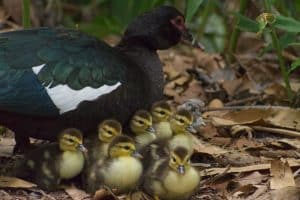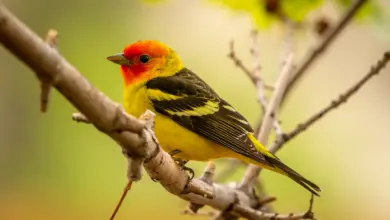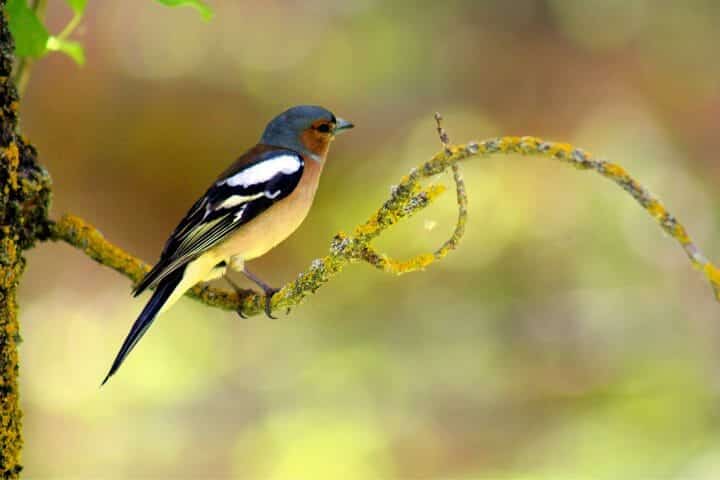How to Care for Baby Muscovy Ducks?
How to Care for Baby Muscovy Ducks? Complete Guide
Are you planning to raise muscovy ducks? This guide will tell you all you need to know about how to care for baby muscovy ducks.
Muscovy ducks are a great backyard addition. They eat pests, insects, and mosquitos and are considered quiet ducks because they aren’t as noisy as Mallard-derived breeds.
Some people also raise them for their meat, which is considered high-quality, low-fat stuff.
Muscovy duck eggs are also a good source of protein and folate.
But if you’re considering breeding muscovy ducks – know that it can be both difficult and rewarding.
Muscovy chicks are hardy, lively, social, and yet quiet and beautiful creatures.
In this article, we delve into the do’s and don’ts of raising muscovy chicks right from incubation to mature adults.
How Do Muscovy Ducks Care for Ducklings in The Wild?
In the wild, mother muscovy ducks will lay around 3-4 eggs every week during mating season.
After incubating them for a period of 30 to 35 weeks, the eggs hatch into little ducklings.
Mothers are the primary caregivers, with male ducks being largely absent from the scenario.
Males are seasonally monogamous. Hence, all chicks in the group are from the single male duck.
Males help out by protecting the territory from predators and other males.
Ducklings stay with their mother for up to 12 weeks and form close bonds among siblings.
They are also prone to imprinting, and in the case of a caretaker (in the absence of a mother), they will imprint on the person rearing them.
In the wild, they mainly feed on a high-protein diet made from insects by foraging themselves. A single year might see as many as four batches of young ones.
Mothers nest on the ground and are very aggressive and territorial about their nests and ducklings.
Hatching & Incubating a Muscovy Duck Egg
Hatching muscovy ducks’ eggs is considerably difficult among other breeds of ducks.
While it can be done artificially via an incubator, for best results, breeders usually offer the eggs to a female duck or a broody hen for a period of 10 days.
After this, it is incubated artificially.
If you are using an artificial incubator, here are the steps you can follow:
Ascertain that the eggs you have are viable.
There are two ways to do this:
If you have a batch from the same duck or brood, you can sacrifice one to figure out if that batch is fertile.
Crack open one egg and study the germ spot. The germ spot is the white spot on the yolk.
In fertilized eggs, it is larger and surrounded by another white ring. If you see this, you can assume that the batch is fertile.
You can go ahead with incubation and candle the eggs after a period of 6 days.
Usually, some form of development can be seen at this stage. If you don’t see any development even after ten days, the egg is likely, not viable.
Alternatively, if you see any eggs which are cracked, mottled, or underweight – discard them to save incubator space.
You can consume or sell them.

Muscovy Duck eggs in a nest basket
Clean the eggs
The collected eggs may have dirt on them. Clean these to prevent the growth of any bacteria. Newly hatched chicks are especially susceptible.
Use a warm, damp cloth for this. Do not wash the egg, as it can wash the protective waxy coating. You can also use light sanitizer or chlorine and iodine-based cleaning solutions.
Incubating the eggs
It’s best to start incubating the eggs within 7 days of hatching. If you do have to store the eggs, do so at 13°C, with a humidity of around 75%. Fertile eggs will lose viability after the 7-day mark, no matter how well they’re stored.
Once you’ve selected a batch for incubating, set the controls:
- Temperature: The best temperature is 37.5°C or 99.5. Invest in an auto-egg turning incubator; otherwise, you will have to turn the eggs every 8 hours. Make sure that the turning angle is 90° every time.
- Humidity: Keep the humidity between 65% to 70%. Increase it to 70% (if less) once you see cracks appear on the eggs.
Candling
Candling involves shining a bright light through the eggs to see through the shells.
From the 6th or 7th day, you can start candling the eggs to study embryo development.
If the egg is live, you will see a dark spot at the large end, which will have blood vessels.
If the egg is infertile, the yolk will remain clear or show a dark mass that is attached to the shell (discontinued development).
Remove the dead eggs and replace them with a new batch. Another candling session can be done at the 25-day mark to remove more duds.
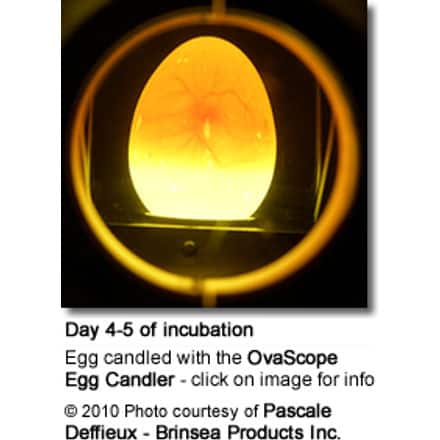
Egg Candling
Hatching
Muscovy duck eggs only show around 60% to 75% hatchability per batch.
Once you see the ducklings have hatched, remove them from the incubator and take them to the brooders.
Do not disturb hatching chicks, and let them pip out on their own. Reduce the temperature at this time by 0.2 degrees.
How to Care for New Born Baby Muscovy Ducks
Newborn babies take up to 24 hours to start moving, preening, and fluffing out their feathers. Once hatched, you should move them to a brooder immediately.
Introducing Ducklings to a Brooder
A brooder is essentially a setup that replicates a nest and provides ducklings with the necessary warmth.
It can be a cardboard box or a tank, or else you can even buy one of these at bird stores.
It should have a heat lamp or a UV lamp nearby to provide warmth and have walls that are long enough to prevent the duckling from toppling out.
The ideal temperature to maintain around the brooder is 90 F.
Every week you can keep dropping the temperature by 5F until it reaches the ambient temperature of your region.
Ducklings huddle up to one another if they’re cold and will pant and spread their wings if not.
Use their body language to get a better idea of which temperature best suits them.
Up to 8 weeks, it’s best to keep the duckling away from other birds, though you can eventually let it out of the brooder (supervised) for short durations.
Other things you can set up in the brooder are:
Bedding
This is essential for the chick to move about and remain warm.
Wood shavings and tissue clippings are commonly used – but be careful if you use a heat lamp as these are flammable items.
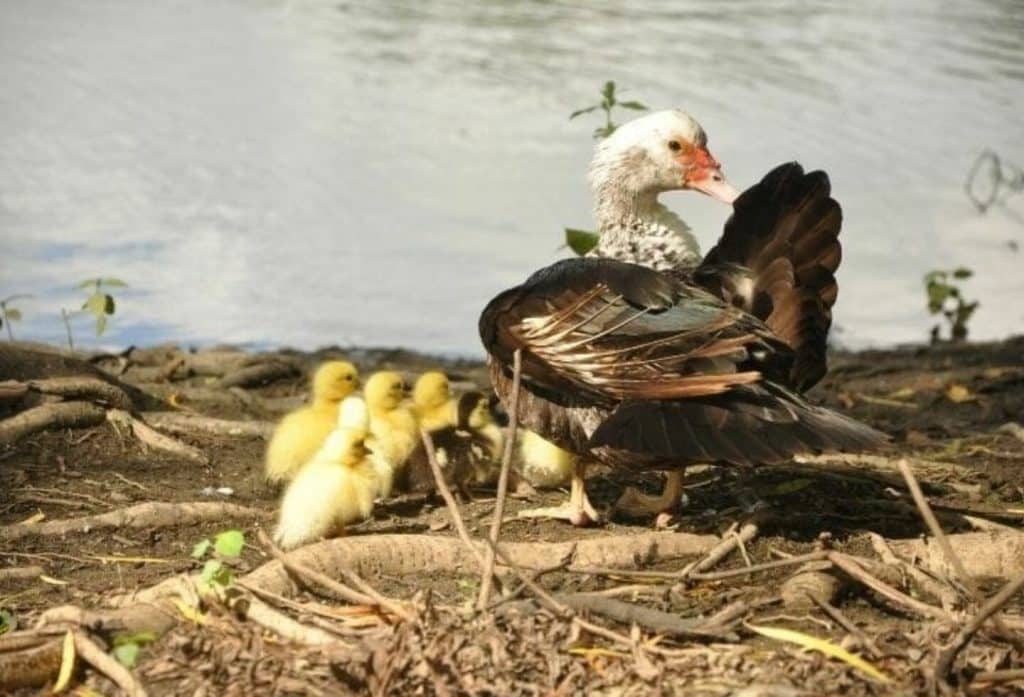
Muscovy duckling with mother
Immediate nutrition
Hatching takes a lot of energy. After hatching, use a dropper to feed your bird some electrolyte water.
This is a mixture of one cup of warm water, two spoons of sugar, one-eighth teaspoon salt, and baking soda.
Food
You can start feeding the duckling after 24 to 48 hours of hatching. Until then, they just absorb the yolk around them.
Place a shallow water source nearby until then, but your duck may choose not to drink at all – which is also fine.
You can add some nutritional yeast to the water for niacin content.
Once they have just absorbed the yolk into their stomach, you can start feeding them starter feed, grit, or vegetables like lettuce and dandelions.
If your duckling isn’t eating, gently tap the food and water bowls and tap their beaks to stimulate action.
Handling
Muscovy ducks do not like being held and are not as cuddly as Pekin or Mallard ducks.
It’s best not to handle ducklings during the first week as they are still absorbing the yolk, getting used to the world, and feeding a lot.
Taking Ducklings Outside
Once the ducklings are eating regularly, you can start putting them out in the grass and foraging around for grit and pebbles.
During this time, don’t introduce them to other ducks or hens.
If you are not around them when they are out, put them in a cage and place the cage on grass.
Cover one portion so that they can retreat to the shade if needed. Only place them out if the temperature is 75F or higher.
Introducing Ducklings to Others
At around eight weeks of age, you can start placing the ducklings inside a cage and within the coop.
Well-raised and domesticated ducks will not pick or hurt them; however, you need to supervise their reception.
If they get along well, you can freely introduce the ducklings at 12 weeks.
You can also provide escape areas, such as boxes that are too low or small for larger birds to get into.
Do not let muscovy ducklings get into water
Muscovy Ducks: How Long Do They Need A Heat Lamp?
Heat lamps are necessary for the first few weeks and usually not for more than three weeks.
However, ducklings will naturally huddle for warmth and go closer to heat sources, be that a human or a charger.
You should gradually decrease the heat lamp intensity to get the ducklings used to the ambient temperature in your area.
Brooders should generally be heated in such a way that the temperature gradually decreases over the area.
This gives the ducklings the option to remain in the area that suits them the most.
What Kind of Bedding Do New Borns Need?
The best bedding is wood shavings, specifically pine shavings. Alternatively, you can use a broken-down straw, hemp, or aspen.
What you should not use are hard shavings, cedar shavings (they give off a toxic fume), and newspaper clippings (they get slippery when wet and attracts mold).
What To Feed a Newborn Muscovy?
You can feed them an unmedicated starter which is available in pet stores.
If this is not available, you can feed them finely chopped green vegetables such as lettuce or spinach, peas, and mashed potatoes.
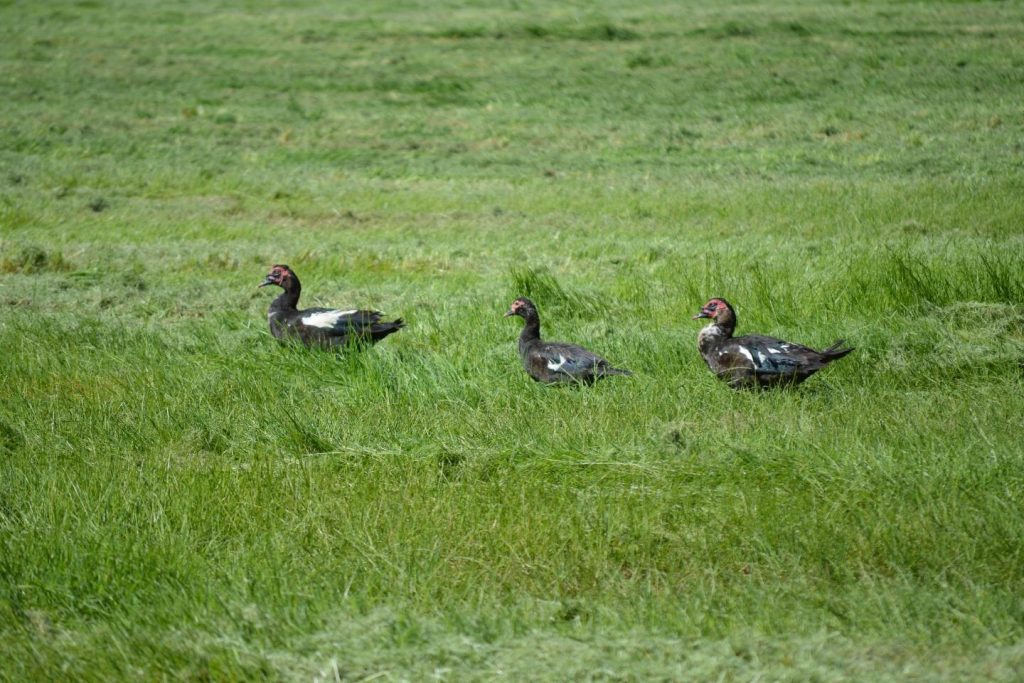
Muscovies love to forage for food.
What Should Newborns Drink?
Ducklings love water! Even though muscovies aren’t very water friendly (in terms of ducks), they do enjoy water both for playing and drinking.
Newborn ducklings consume around half a gallon a week. Provide them with drinking water that is mixed with nutritional yeast.
Medicines for Newborn Muscovies
Ducklings should be given:
- The cholera vaccine between 3 to 4 weeks of age
- The plague vaccine between 8 to 12 weeks of age
How to Handle Baby Chicks
You should not handle baby ducks for some time after they are born.
If your duckling is friendly and comfortable with you touching them, you can pick them up by firmly supporting their read end with one hand.
Do not close in around their head or block their vision.
When picking up a chick, approach from the front. If you want to transport the duck, use a small carrier instead of handling them directly.
Sexing Your Muscovy Duck Hatchling
It is very difficult to sex muscovy ducks early on. The only way to do this is vent sexing, but it is considered dangerous and should only be done by professionals.
If you do it wrong, the duckling can get seriously injured.
After about four weeks, males and females would start showing differences in their physical features like caruncles and size to help you distinguish the two.
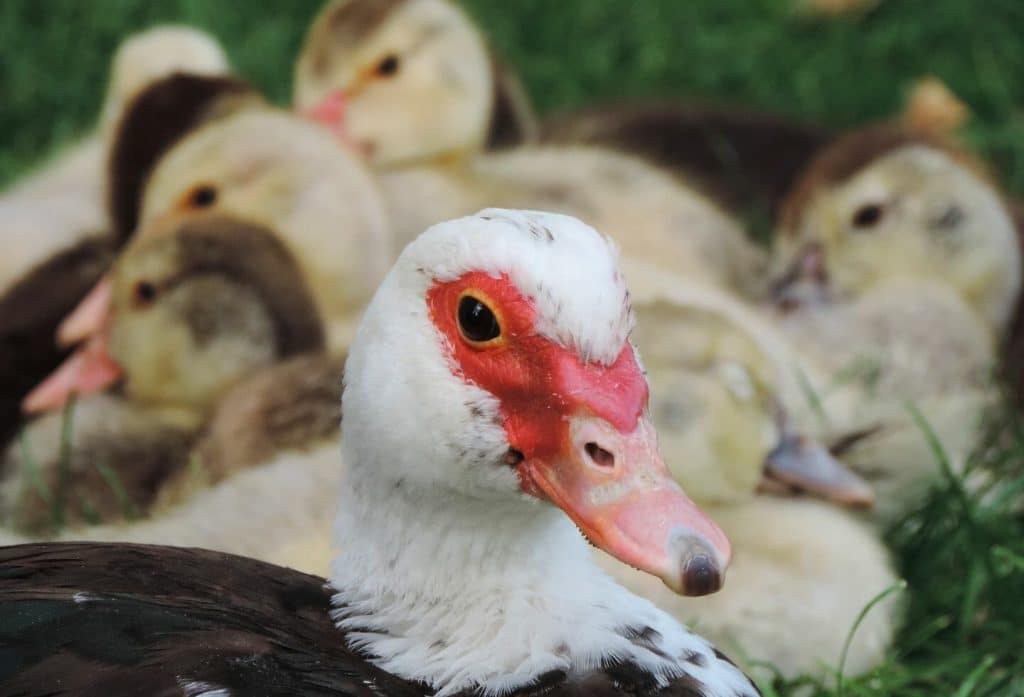
Mother Muscovy Duck with babies
How to Raise Baby Muscovy Ducks
Raising ducks can be a new experience every time. Here are some things to keep in mind:
Ducklings Will Start Foraging for Food by Themselves
Once ducklings are let out in the grass, they will start foraging by themselves.
They prefer this to prepared feed and mostly look for grains and small insects. Foraging is a good habit for ducklings to develop.
Do Not Handle Them Without Protective Gear
Muscovy ducks are perching birds – they aren’t like other ducks. They have sharp claws that they use to hold onto tree branches.
If you try to handle them, there is a lot of risk of injury from the claw. So it is best to use the protective gear instead.
Do Not Keep Them in Shallow Breeders
Ducklings can topple out of shallow broods.
Make sure that the walls of your brooder are high enough and the lamp is at a safe enough distance so as to not burn the chicks.
What to Feed Baby Muscovy Ducks?
Baby Muscovy ducks can be fed peas, corn, grass, grains, mashed potatoes, and finely chopped vegetables.
You can also feed them starter feed as long as it is unmedicated.
Once older, they will become omnivorous and feed on mosquitos, slugs, small crabs, bugs, and more.
Once they become mature enough to start egg production, you can increase the calcium in their diet.
Baby Muscovies Should Not Go Near Water
adult ducks have oil glands that secret water-repellant oil, which they smear on their feathers before entering the water.
Baby ducks do not have these glands and rely on their mother to oilproof them.
If your duckling does not have a mother duck, it’s best to keep them away from water bodies.
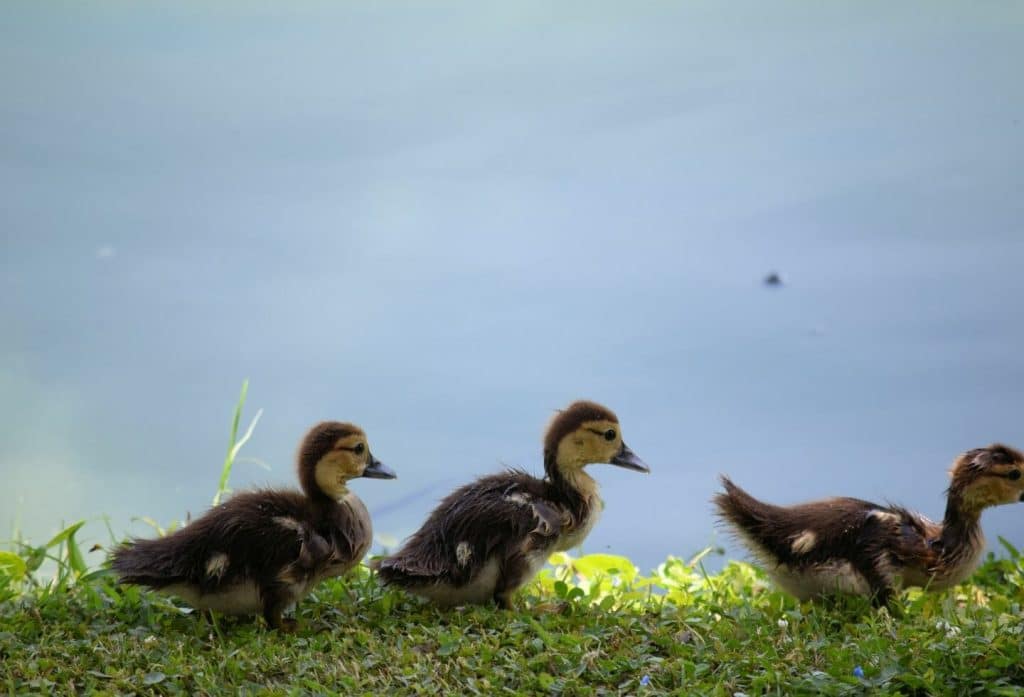
Raise Muscovies in Pairs, Not Alone
Muscovies are friendly ducks and form strong sibling bonds.
You should never raise a chick alone, as it might be prone to anxiety in the absence of another duck.
Anxiety can manifest itself as poor eating habits or feather plucking in ducks.
How to Build a Baby Duck Muscovy House
You can follow along with DIY tutorials to build your own coop. The coop should ideally be:
- Predator proof
- Have different sections to segregate ducks if needed
- Have enough space for the entire brood
Though they’re from South America, muscovies are quite winter-hardy. Still, it’s best to have an enclosed coop with a roof and gate to close ducks in during the cold.
Wrap Up
Ducks are hardier than chickens and do not need a lot of coddling. However, it is the incubation process that is much tougher and shows a lower successful percentage. Many artificially incubated eggs fail at the last stage; hence late-stage candling is essential to weed them out.
Thank you for reading.
Frequently Asked Questions?
If Muscovy Baby Will Not Eat Can They Have Duck Yolk?
Duck yolk is as nutritious as muscovy duck yolk. It is high in protein and fat, which can help provide the necessary energy and nutrients for the baby to grow.
Make sure that you mash it up before feeding it to the baby.
However, I would suggest that you consult with a veterinarian before doing anything.
How to Care for a Baby Muscovy Duck?
Letting them forage for their own food,
Using protective gear when handling them,
Keeping them in safe brooders,
Feeding them a variety of foods like peas and other greens,
Keeping them away from water until they have oilproof feathers,
Raising them in pairs to prevent separation anxiety, and
Building a predator-proof and spacious coop.
Muscovy ducks are friendly and develop strong sibling bonds. They are also winter-hardy but need a safe and enclosed coop during cold weather.
What can you feed baby Muscovy ducks?
As they grow older, they become omnivorous and feed on insects, small crabs, and more. Once they start laying eggs, their diet can be increased in calcium.
How fast do Muscovy ducklings grow?
Domesticated males can grow to 15 pounds, nearly twice the size of females.
They have a varied diet, including small animals, insects, and plants.
Muscovy ducks are effective at reducing fly populations, with the ability to reduce them by up to 90 percent in cow pens.

